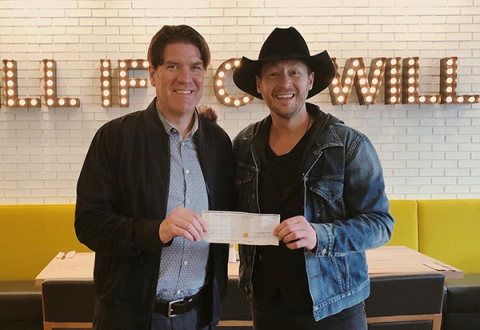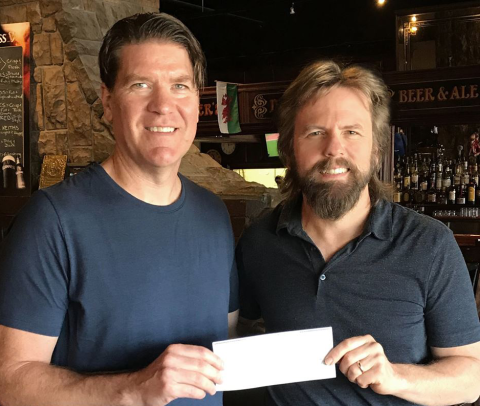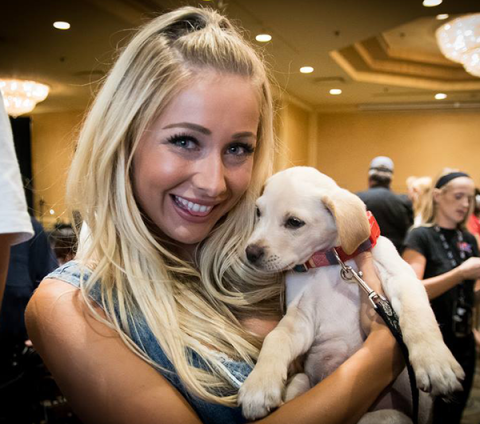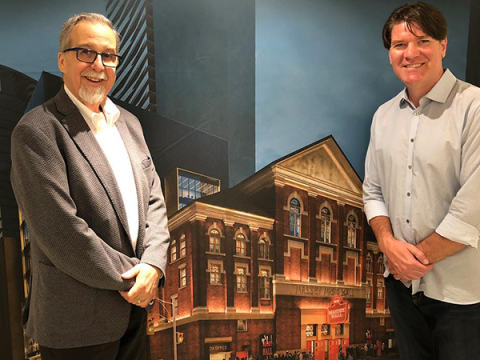
Ron Kitchener began his RGK Entertainment Group a quarter century ago to help manage the careers of up-and-coming Canadian acts, primarily in the country genre. One of his first, a client to this day, is award-winning singer/songwriter Jason McCoy. The roster has also included Johnny Reid, Dean Brody, Madelaine Merlo and Tim Hicks. A decade into RGK’s run, Kitchener diversified the company by adding a record label, which for a significant spell distributed Big Machine Label Group, and their artist, Taylor Swift, as well Reba McEntire and Brantley Gilbert.
The year 2018 marks the 15th anniversary of that venture, Open Road Recordings. To celebrate, Kitchener and his staff decided to do 15 acts of kindness In 15 days, leading up to the 2018 Canadian Country Music Association Awards (CCMAs) Sept. 9 in Hamilton, Ontario.
A total of $18,500 was donated to 15 different organizations or events across the country, but as Kitchener tells Samaritanmag, many of the activities and donations were made in the moment, supporting causes near and dear to the hearts of Open Road and RGK talent. There was no set amount for each donation, and sometimes time and talent were also donated as well as cash.
Charities included the Royal Victoria Hospital Foundation (Radio 4 Cardiology), a #MusicRescues event supporting Team Dog Rescue, Ladybird Animal Sanctuary and Danes in Distress. Fifty care packages were donated to the Red Door Family Shelter in the GTA, money was donated to the Special Olympics Canada, Covenant Children’s Homes in India, the Canadian Mental Health Association, Heart and Stroke Foundation, Unison Benevolent Fund, the London Girls Rock Camp, local mental health organizations during Madeline Merlo tour stops, the Massey Hall Forever Campaign, the National Music Centre in Calgary, Paul Brandt’s #NotInMyCity anti-sex trafficking program. As well, RGK and Open Road purchased a block of 26 tickets for family members and first responders affected by the Aug. 10 shootings in Fredericton that killed four people, including two police officers, to attend the upcoming Fredericton Strong Benefit Concert on Oct. 6.
What was the impetus behind doing 15 acts of kindness in 15 weeks?
I was sitting around the boardroom with my team and we were just talking about our 15th anniversary coming up and I said that this obviously warrants a bigger than ever party at the CCMAs because that’s generally where we would celebrate the next year. And for whatever reason and whatever mood I was in that day I just said, “You know, I am tired of doing all these parties. All we ever do is parties.” We were always were the party of the weekend. I thought, “Why do a party and only get a portion of the industry?” We don’t do enough to give back, even though we already do a lot to give back. We have never done it on a public level. We have done it with our artists and in and around our artists, and all that. I said why not do something as a label. And literally right in that moment, in that meeting, I said, “Why not 15 acts of kindness in the 15 weeks leading up to the CCMAs?” It just rolled out of my brain.
It really wasn’t monetarily driven. It was more about finding opportunities to just help organizations, charities, people, moments that corresponds with what we do in our business. And then the more I thought about it, I realized that some of these things could be personal to me, some could be personal to the staff, some of them could be based on an artist’s charity that they are involved in and we support that and give them a little bit of a social media spotlight. That’s really how it came together.
You’re saying it was pretty off the cuff. You improvised some of the ideas or just felt compelled in the moment for a specific donation? Was thing how it operated?
There was no grand PR plan around it. We weren’t trying to take any extra advantage of doing it to gain notoriety for the label, even though at the end of the day, celebrating 15 years I figured 15 weeks it would gain traction, people would notice. And if they didn’t, hopefully they would eventually hear about it, and if they didn’t so be it. For each week it was something that was near and dear to us as a team and we felt good about it.

It was one thing after another and as the weeks went by, we were just wondering what to do next. Some of them we had in mind ahead of time, and some weeks were totally spontaneous. Giving money to Massey Hall, our amount was a drop in the bucket, but Massy Hall was a very important place that I had watched concerts for years. So again, it wasn’t so much about charity, it was about supporting things that made sense to us, with no real agenda.
Give us a little more detail on the projects you mentioned.
The radio station Jason now works for was doing one of their drives. Paul Larche from Larche Communications has owned that station for years, although he just sold out to Bell, has been a dear friend as well, and with Jason going on air there, I just thought the combination of all that made sense. I grew up in Tottenham, Ontario, just south of Barrie, and spent a lot of time in Barrie and Jason became my first client, who happened to be from Barrie. So, there was a lot of those connections, and I have always admired what Paul has done up there and he has done great work in supporting the hospitals and supporting equipment that is needed inside those hospitals that is not being supported for other measures. Paul has just been amazing raising money for the Royal Victoria Hospital in Barrie in particular. Again, this doesn’t necessarily resonate on a national basis, but that’s okay. It was important because it was tied to something that Jason was doing. I thought that my almost 25-year management relationship with Jason and 15 years with the label would be a great way to kick off the campaign.
How much money did you donate and how was it dispersed?
We gave away $18,500, plus we gave some time from us and our artists of course. I said if I am going to give money away, it will be about $1,000 per charity. Some charities weren’t that much, and others were a lot more. Unison [Benevolent Fund] benefitted a lot more. I gave more to that charity and not as much to a couple of others, but then for others we donated a lot of time for thing, like what Tim did. I gave money to the Heart & Stroke Foundation, but I also brought Tim down to play. So, Tim gave a free concert, so Tim donated his time.
How about some of your other artists? What sort of projects did you partner with them on for this project?
Dean Brody has his own foundation that does great work, that really doesn’t get recognized because Dean often just gives his own money away, and a lot of people don’t realize that because he’s not out there waving a flag about it. I decided I will use one of our posts to tell everybody how the goodness of what you do on a very quiet basis, even though its not like he doesn’t want to promote it, he just doesn’t go out of his way to promote it. It just gave some recognition to what he was doing.

Again, there was no method to it, but if it was just a visit and something we could give recognition to, then $1000 was the plan. It’s not a lot of money, but it was a little bit that helps and gives attention to the cause.
I thought Paul Brandt’s #NotInMyCity endeavour is incredible and Paul is such a great ambassador for all the things he works on. He is a legend in our business, from a country standpoint, and appreciate all the things that he is about, and the #NotInMyCity campaign is something that is really important to him certainly, and is a charity I can certainly understand, even though it’s not in my backyard, I understand it could be in my backyard. When I was in Calgary doing a thing with Tim, I asked Paul to tell me more about it and I wrote him a cheque.
We did something for Special Olympics, and that was just really tied to me personally in knowing some people who are involved. I just really got taken in by being there at the Special Olympics the National Summer Games in Antigonish [Nova Scotia]. We have a summer home not far from there, so it was easy for us to go there and visit and meeting all the athletes and watching how committed they were, and the teamwork and just everything about it, was very inspiring. So, I gave them a little more than I had planned, but it was something important to me.
Has Open Road done anything with them before?
We have done a little bit with the Special Olympics over the years, but it’s not officially tied to our label in any way, but it was important to me. We did the two or three things with mental health organizations because that is important. And we did more things with Unison that aren’t tied to the 15 acts, but we always do stuff with Unison and we should. It’s the same with MusiCounts and all those organizations that are really close to the business, we like to support as well.

Every one of our artists is involved like that. Right from the beginning, we encourage it, but it’s never something we have to work very hard on. Our artists are always very willing, and that’s more about us picking the artists that we pick. It’s part of why the artists that we ultimately work with are the ones that are the giving ones, and they have the personalities that support that because those are the kind of artists we want to work with.
And we have always facilitated opportunities for our artists doing charity events, concerts, raising money for this that and the other, being available, signing merchandise for auctions. We have never stopped doing that because we think it’s absolutely essential to an artist’s career that they give back or are supportive of as much as they can possibly do, in their own community and within the wider community of the business that they’re in, either the music business period or the country music scene. Whatever it is, they are always willing, and you can get that from things like the Charlie Major & Friends album, we’ve got a bunch of artists on that, to the Rise Up Redux, we’ve got six of our artists on that. Those are endeavours that certainly have promotional appeal, but mostly it’s because they are good initiatives and the initiatives we want to be a part of.
Are there any ideas about what you will do for your 20th anniversary?
Yes, absolutely. I have had a blast being involved in this, and I wish we could do even more. I thought it was a good little play on 15 weeks leading to the CCMAs where we put out our first record 15 years ago, just playing on that. Fifteen is not your 10 and its not your 25 benchmark, but I am really proud of the team for rallying around that and instead of thinking about what kind of party we could put together, donated some time and some money, and put a little spotlight on some things that are of need.
The business keeps evolving and changing and it’s hard to say whether there is going to be a 20-year anniversary. We are a focused management company, with a label; we’re not a label with a management company. So, who’s to say that it might not evolve into something else by that point. But its onward and upward, we’ve got a lot of exciting things down the pipe with some releases and some new artists. We’re bullish on the future, it’s just a matter of seeing how it all happens.
Longevity in any business is rare, but particularly the music business. How does it feel to hit the 15-year mark?
Fifteen years seems to have gone by really fast. We have been a management company for 25 years, and 10 years in I decided to start the label. Some days you feel like you’ve been in the business too long and other days you feel like you’re just scratching the surface and can’t wait to finally do something important. With Open Road, I feel it’s been a good run. But keep in mind, we are a management company first and foremost. The label, while we have had great success, with putting out Taylor Swift records and all the Big Machine stuff, and all the Johnny Reid records and the Road Hammers, I have always felt it’s just an extension of the management company.
Many managers in Canada start labels and we put out our records because some of the options of putting out and developing acts with other labels don’t always work out necessarily because of schedules and all that. That’s why I started it and almost everything I have started after the management company, from the publishing to the websites to the label to the television companies has been based on me casting a net and not feeling like I was going to get the kind of results or the return from prospective partners.
The label, I hadn’t really thought of it in terms of whether I view it as a success or not. But certainly, from the very first record we put out, it has catered to what I want it to do, and, yes, it went beyond that. You know, nobody thought that, even when I signed with the Big Machine label because of a great connection between Scott Borchetta and me. I never thought a year later we would be selling millions of Taylor Swift records, even though I knew Taylor was a special artist. You just never know in this business. So, I am really blessed and fortunate for that connection with Scott where, for seven years we were able to put out Taylor records and Reba records and Justin Moore and Brantley Gilbert records.
Please support Samaritanmag's original journalism by making a PayPal contribution using the email info@samaritanmag.com so we can increase the amount of content and writers we hire. Samaritanmag is the anti-tabloid, covering good people trying to change bad things. Let's make this thing bigger than TMZ.
Air Jordan 1